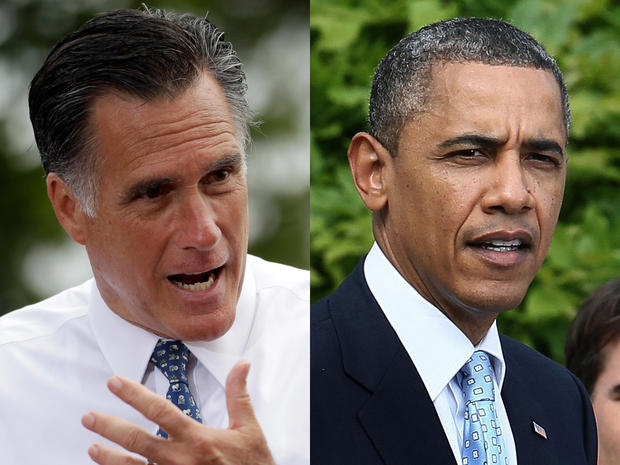Five takeaways from the new CBS/NYT poll
News Analysis
You probably know the headline by now: In the new CBS News/New York Times poll, President Obama and presumptive GOP nominee Mitt Romney are in a dead heat, with each man receiving support from 46 percent of registered voters.
But there's a lot more to the poll than just the headline. Below, five findings from the survey that provide important insights into the state of the race:
Romney has Republican support - but not their love: Republicans have united around Romney, with 54 percent now saying they support him as their nominee - up from 30 percent in March, when Rick Santorum was still in the race. But after a long and bruising primary campaign, their support is grudging at best.
Just 33 percent of GOP primary voters "enthusiastically support" Romney - less than the 40 percent who say they support him with reservations. And 18 percent say they're backing Romney only because he is the nominee. (Eight percent say they don't support Romney.) The numbers are particularly bad among white evangelicals: Just 27 percent enthusiastically support Romney, while 50 percent have reservations.
The good news for Romney is that he still has time to define himself favorably among registered voters overall. While just 13 percent say they are undecided or need to know more about Mr. Obama to decide if they have a favorable view of them, 37 percent are undecided or haven't heard enouth about Romney. Both candidates currently have underwater favorability ratings - Mr. Obama is viewed favorably by 42 percent and unfavorably by 45 percent, while Romney is viewed favorably by 29 percent and unfavorably by 34 percent - but Romney has more room to win people over. Of course, that also means the Obama campaign has room to define Romney negatively.
Obama is winning the beer test: In the past few presidential cycles, the candidate who has generally seemed more relatable - the one you'd prefer to have a beer with - has won the election. For example, think George W. Bush versus John Kerry and Al Gore, or Bill Clinton versus George H.W. Bush and Bob Dole. The rule doesn't always hold, but the candidate who voters can identify with more directly generally has a big advantage in a presidential race.
And on this measure, Mr. Obama has the edge. About half said Mr. Obama is someone they can relate to, roughly the same percentage who said he is not. Romney's numbers are much worse: 34 percent say they can relate to him, while 60 percent said they could not. Romney has made a number of comments during the campaign that have reminded voters of his enormous wealth - that his wife drives "a couple of Cadillacs," that he has "some great friends who are NASCAR team owners" - and he runs the risk of being defined as too removed from the problems of everyday voters to understand them. That four-car garage with its own elevator isn't going to help.
But that doesn't mean he isn't weak: Romney may be a relatively unpopular nominee, but the incumbent isn't exactly flying high either. Just 42 percent view Mr. Obama favorably, and 48 percent say they are not too or not at all confident in his ability to make economic decisions. (The economy is overwhelmingly the top concern of voters.) The relative unpopularity of both candidates dictates campaign strategy: The Romney camp wants to make the election a referendum on the less-than-loved president, while the Obama camp wants to make it a choice between the president and his less-than-loved challenger. With neither candidate particularly strong, each side is incentivized to tear down the opponent enough so their guy can squeak through - which means you can expect a nasty general election fight.
Married women vs. single women: The conventional wisdom is that Mr. Obama has an advantage with women and that Romney has the edge with men, and that holds true in this poll: The president leads 49 percent to 43 percent among women, while Romney leads 49 percent to 43 percent among men.
But women are not a monolithic group: Among married women - who represented 29 percent of registered voters in this poll - Romney has the edge, 49 percent to 42 percent. The president, meanwhile, dominates among single women, 62 percent to 34 percent. The poll shows the president has a big edge over Romney when it comes to who voters are confident will make the right decisions on women's health issues, but such issues would seem to be more important to single women than married women. For Romney, the best path to closing the gap among women may not be to win over single women, but instead to maximize turnout among women who are married.
The future looks grim: Nearly half of Americans - 47 percent - say things will get worse for the next generation - including a whopping 57 percent of parents with kids over age 18, many of whom are struggling to find jobs. Just one in four say things will be better for the next generation, suggesting that Americans do not see a world in which they can easily make a better life for their children then the one they had.
The (relative) good news? The percentage who predicts a worse future is actually down 11 points from 1995, when it hit 58 percent. So while Americans don't see a lot of good on the horizon, they're slightly more optimistic than they were in the wake of the recession that hit in the early 1990s.
More from the polls:
Obama, Romney in dead heat
Poll: Economic outlook dim, but improving
Poll reveals gap between married and single women
Read the complete polls (PDF)
